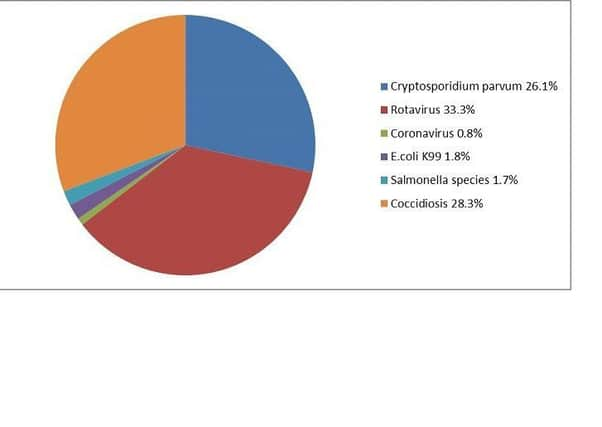Control of calf scour - Seeing the bigger picture


Rotavirus and Cryptosporidium parvum are the most common offenders in calves <3 weeks of age. Mixed infections are quite common and often fatal. Testing diarrhoeic calves allows for accurate diagnosis and this is crucial for the successful implementation of a control programme.
Irrespective of the cause of scour on your farm, good calving management, adequate colostrum intake and hygienic practices are the cornerstones of calf health.
The calving unit
Advertisement
Advertisement
Calving pens must be cleaned and disinfected regularly. Discuss suitable disinfectants with your vet (Important to note that Cryptosporidium parvum is resistant to most commonly used disinfectants). A good straw bed is paramount. A clean cow entering the calving pen and personal cleanliness (our boots, overalls, etc.) plays a big part in minimising disease risk to calves. Aim to remove the calf from the calving pen within the first hour of life.
Colostrum feeding
It is recommended to feed 3-4 litres of colostrum to the newborn calf within the first 1-2 hours of life. Colostrum contains protective antibodies.
The ability of the calf to absorb these antibodies is at its greatest during this time and colostrum milked from the cow within the first hour after calving has the highest level of antibodies. It is important that the feeding utensils (colostrum bucket, bottle, stomach tube etc.) are clean. It is advisable to monitor colostrum management through testing, ask your vet regarding sampling.
Vaccination of the cow pre-calving
Vaccination can be used to increase colostral antibodies to certain bacteria and viruses. Vaccination helps to bridge the gap between birth and development of the calves’ own immune system to fight disease.
Advertisement
Advertisement
- Vaccination against E.coli, rotavirus and coronavirus: The cow should be vaccinated according to the manufacturer’s recommendation. One of the vaccines can be administered, as a single dose primary course, three weeks to 12 weeks prior to calving (often administered at drying off).
- Vaccination against Salmonella species: Replacements should be vaccinated with a primary course six and three weeks pre-calving with cows receiving a booster vaccine three to four weeks prior to calving
Administration of a product containing halofuginone lactate
- On farms that have had problems with Cryptosporidiosis in the past, the calves should be treated with halofuginine lactate for the first seven days of life. It reduces the severity of disease and reduces the number of eggs excreted. This product is a prescription only medicine and is available from your vet.
Prevention of human infection
Cryptosporidium parvum and Salmonella species can also cause disease in humans. Young children, immunocompromised adults and elderly folk are most at risk. People may become infected through contact with infected animals.
Best practice for control of calf scour
We need to focus our attention to reduce the disease challenge to newborn calves and to ensure they receive adequate immunity via colostrum feeding and vaccination.